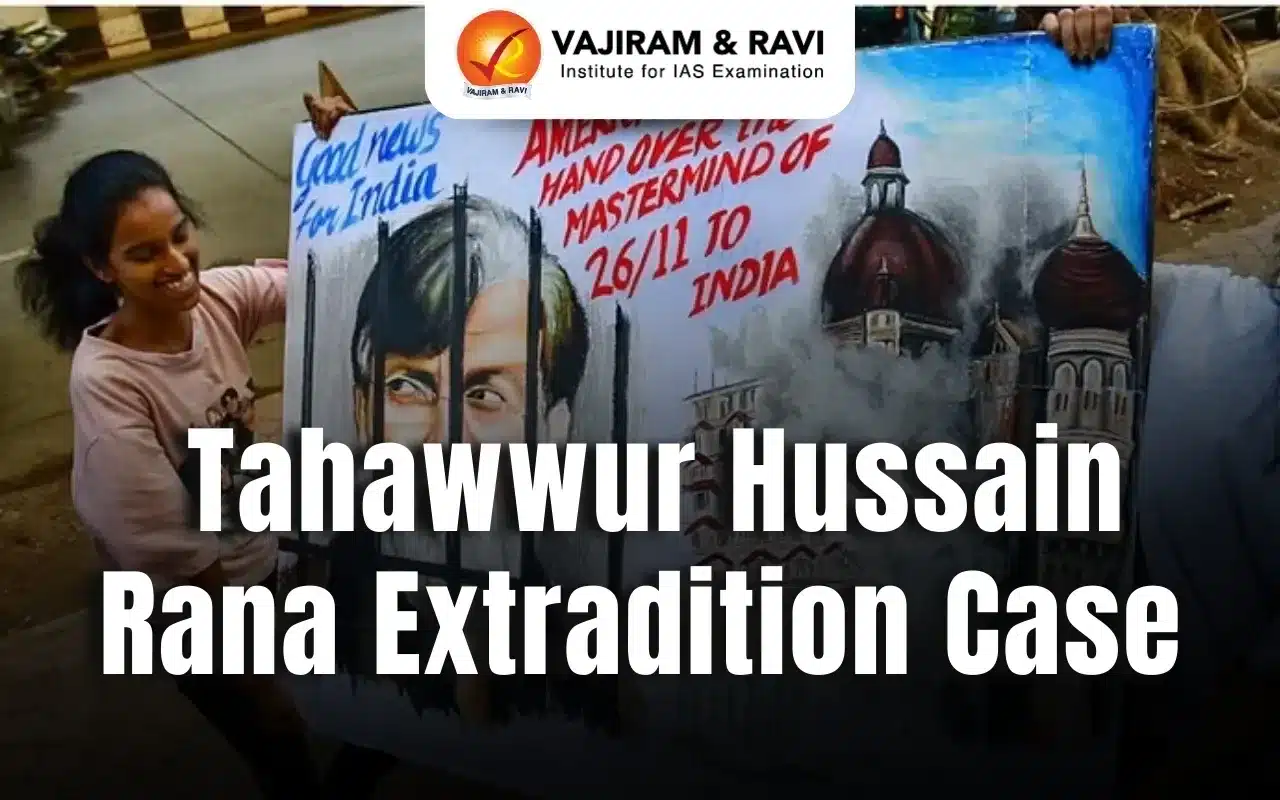What’s in Today’s Article?
- Tahawwur Hussain Rana Extradition Case Latest News
- Background – Rana’s Involvement in 26/11 and Other Cases
- Legal Battle Over Extradition
- India-US Extradition Treaty (1997)
- US Position on Indian Extradition Requests
- Conclusion
- Tahawwur Hussain Rana Extradition Case FAQs
Tahawwur Hussain Rana Extradition Case Latest News
- The United States Supreme Court has rejected the plea of Tahawwur Hussain Rana, an accused in the 2008 Mumbai terror attacks, against his extradition to India.
- Rana had filed an “Emergency Application for Stay” following former President Donald Trump’s approval of his extradition.
Background – Rana’s Involvement in 26/11 and Other Cases
- Rana, a Pakistani-origin Canadian national, is accused of aiding and abetting reconnaissance activities for the Mumbai attacks along with David Coleman Headley.
- Arrested in Chicago in 2009 for involvement in the Mumbai attacks and a foiled attack on the Danish newspaper Jyllands-Posten.
- Convicted in the US for providing material support to terrorism in Denmark and to the terrorist group Lashkar-e-Taiba. Sentenced to 168 months in prison on January 7, 2013.
- Released on compassionate grounds on June 9, 2020, but immediately faced an extradition request from India.
Legal Battle Over Extradition
- India requested Rana’s extradition in December 2019 under the India-US Extradition Treaty (1997).
- Rana opposed extradition, citing “double jeopardy,” claiming he was already acquitted of charges related to India.
- A US Magistrate Judge rejected his argument in May 2023, stating that Indian charges had distinct legal elements.
- His subsequent petitions to the US District Court, the Court of Appeals for the Ninth Circuit, and ultimately the US Supreme Court were all rejected.
India-US Extradition Treaty (1997)
- It facilitates extradition for offences punishable by more than one year of imprisonment in both countries.
- Acts such as terrorism, hijacking, and crimes against protected persons are extraditable, however,
- Political offences are non-extraditable.
- However, certain actions such as
- The murder or other willful crime against a Head of State/ Government or a member of their family,
- Aircraft hijacking and aviation sabotage,
- Crimes against internationally protected persons, and
- Hostage-taking, etc.,
- are not construed as political offences under the treaty.
- However, certain actions such as
- The US government found “probable cause” to believe that Rana committed extraditable offences under the treaty’s dual-criminality clause.
US Position on Indian Extradition Requests
- Only two alleged terrorists have been extradited from the US to India:
- Charanjeet Singh Cheema (2005)
- Kulbeer Singh Kulbeera (2006)
- The treaty facilitated 11 extraditions between 2002-2018, mostly for financial fraud. 65 Indian extradition requests remain pending with the US.
- The US refused to extradite David Headley due to his plea bargain and Warren Anderson (Union Carbide CEO) due to “insufficient evidence.”
Conclusion
- The US Supreme Court’s rejection of Rana’s plea paves the way for his extradition to India, where he will face charges related to the 26/11 Mumbai terror attacks.
- This case highlights the complexities of international extradition, diplomatic negotiations, and legal interpretations under the India-US Extradition Treaty.
Tahawwur Hussain Rana Extradition Case FAQs
Q1. What are the key provisions of the India-US Extradition Treaty, 1997?
Ans. The treaty allows extradition for offences punishable by over one year of imprisonment in both countries while exempting political offences.
Q2. Why did the United States Supreme Court reject Tahawwur Rana’s plea against extradition?
Ans. The court upheld India’s extradition request, rejecting Rana’s “double jeopardy” claim, as Indian charges had distinct legal elements from those tried in the US.
Q3. What was Tahawwur Rana’s role in the 2008 Mumbai terror attacks?
Ans. Rana was accused of aiding David Headley in reconnaissance activities for the attacks and facilitating terrorist operations.
Q4. How has the US responded to India’s extradition requests in previous cases?
Ans. While only 11 individuals have been extradited since 2002, including two alleged terrorists, the US has refused high-profile cases like David Headley and Warren Anderson.
Q5. What legal challenges did Rana face in the US before his extradition approval?
Ans. Rana’s extradition was contested through multiple appeals in US courts, including a habeas corpus petition and emergency stay plea, all of which were rejected.
Source: IE
Last updated on December, 2025
→ Check out the latest UPSC Syllabus 2026 here.
→ Join Vajiram & Ravi’s Interview Guidance Programme for expert help to crack your final UPSC stage.
→ UPSC Mains Result 2025 is now out.
→ UPSC Notification 2026 is scheduled to be released on January 14, 2026.
→ UPSC Calendar 2026 is released on 15th May, 2025.
→ The UPSC Vacancy 2025 were released 1129, out of which 979 were for UPSC CSE and remaining 150 are for UPSC IFoS.
→ UPSC Prelims 2026 will be conducted on 24th May, 2026 & UPSC Mains 2026 will be conducted on 21st August 2026.
→ The UPSC Selection Process is of 3 stages-Prelims, Mains and Interview.
→ UPSC Result 2024 is released with latest UPSC Marksheet 2024. Check Now!
→ UPSC Prelims Result 2025 is out now for the CSE held on 25 May 2025.
→ UPSC Toppers List 2024 is released now. Shakti Dubey is UPSC AIR 1 2024 Topper.
→ UPSC Prelims Question Paper 2025 and Unofficial Prelims Answer Key 2025 are available now.
→ UPSC Mains Question Paper 2025 is out for Essay, GS 1, 2, 3 & GS 4.
→ UPSC Mains Indian Language Question Paper 2025 is now out.
→ UPSC Mains Optional Question Paper 2025 is now out.
→ Also check Best IAS Coaching in Delhi

















